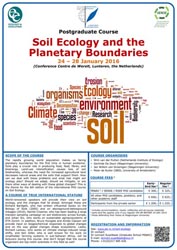| Introduction |
When N2Africa was invited to prepare for a second phase, our funding partner the Bill & Melinda Gates Foundation challenged us to develop a business led approach. N2Africa had rapidly achieved a ‘proof of concept’ of our (GL x GR) x E x M approach - that we need well-adapted legume varieties (GL), rhizobial inoculation (GR) where needed, and that the technologies for crop management (M) need to be tailored to the local conditions (E). Above all we found that the closing of legume yield gaps at farm scale depends on the critical role of good agronomy and integrated soil fertility management to manage deficiencies of phosphorus and other nutrients such as potassium (and less commonly secondary nutrients such as calcium, magnesium and sulphur and micronutrients, notably zinc). We were already working with large numbers of farmers and had learned a lot about the adaptation of technologies to local conditions. The new challenge was to move to scales of operation and to reach farmers in numbers that we had never imagined possible. ...
|
1 |
| On Public Private Partnerships and how they can learn about ‘The Market’ |
|
N2Africa proudly takes stock of the strategic partnerships established to scale out and sustain its promoted services and technologies. Being implemented in 11 countries, N2Africa sealed 86 comprehensive partnerships with public and private organizations reaching 222,850 farmers in 2015-16 and aiming towards 550,000 in 2018. The partnerships are linked to value chain projects with similar objectives, leveraging resources and creating synergies. In this article we describe how partners view the benefits of partnerships, the various market models used in partnerships and the main challenge different legume value-chain partners encounter: how to generate sufficient supply of produce for a market based approach. Using one specific example, we disentangle the factors that determine supply by farmer cooperatives. ...
Right: Ethiopia PPP Poster
|
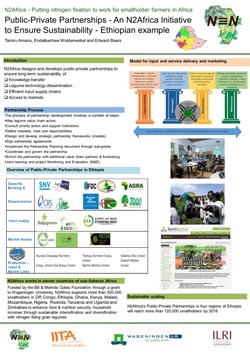 |
|
2 |
| Public-Private Partnerships (PPPs) for Sustainable Input Business: The Case of Menagesha Biotech Industry in Ethiopia |
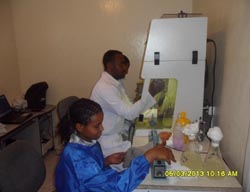 |
Menagesha Biotech Industry (MBI) is a private bio fertilizer producing company established in 2012 with the objective of producing and distributing bio-fertilizers and long run vision of becoming the leading bio-fertilizer producing industry in the region. ...
Photo: Inoculant Production Process at MBI Unit
|
|
3 |
| N2Africa and Feed the Future Nigeria Livelihoods Project Partnership: A working collaboration |
|
In response to solving some of the challenges being faced by most farming households in Nigeria, International Institute of Tropical Agriculture and Catholic Relief Services signed a partnership agreement that provides mutual support and collaboration in the joint implementation of N2Africa and Feed the Future Nigeria Livelihoods Projects in FCT and Kebbi State.
Photo: Participants at a cowpea demonstration site during Green field day at Ujariyo in Kebbi State
|
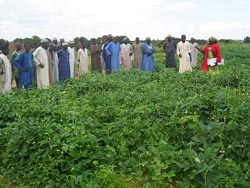 |
|
4 |
| Towards a public private partnership for grain legumes: A case of World Vision Uganda |
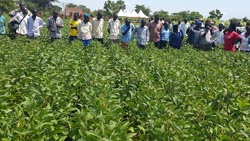 |
Public private partnership (PPP) is a co-operative venture between the public and private sectors on the basis of expertise of each partner. A PPP meets clearly articulated public needs through the appropriate allocation of resources, risks and rewards. ...
Photo: Farmers being taken through the different treatments of the soyabean demo during the field day in Oyam District
|
|
5 |
| Tanzania Legume Alliance |
|
In early 2015 African Soil Health Consortium helped convene a group that became the Tanzania Legume Alliance. This group is now implementing the campaign called Maharage Bingwa (Champion Beans).
The Maharage Bingwa campaign is supporting the dissemination of common bean technologies and practices recommended by the Selian Agricultural Research Institute (SARI) and N2Africa. ...
|
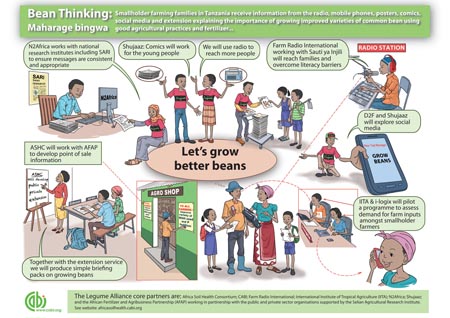 |
|
6 |
| N2Africa D.R.C.: training farmers in agribusiness |
 |
Mr. Berkimas is one of the farmers trained by N2Africa on soyabean processing at IITA Kalambo. After the training he decided to start a small business of soyabean and cassava processing in Kavumu (one of the villages of Bukavu, around 25 km from Bukavu city). Here, soyabean cultivation is common. Mr. Berkimas bought processing equipment worth 4600 US$ with his own funds. ...
|
|
7 |
| N2Africa holds workshop on data collection for university staff, students, extension workers |
|
In view of the need to introduce researchers to contemporary methods of data collection, N2Africa-Nigeria in conjunction with the International Institute of Tropical Agriculture (IITA) organized a 1-Day workshop for staff and Postgraduate students of the School of Agriculture and Agricultural Technology (SAAT).
The workshop took place at the School of Agric Board Room, Main Campus. ...
|
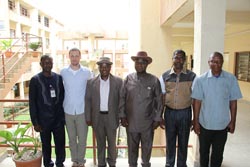 |
|
8 |
| N2Africa Pushes for Improved Soyabean Technologies at Malawi Agriculture Fair |
|
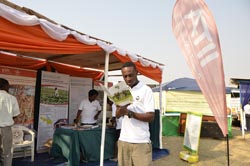
|
The Malawian Minister of Agriculture, Dr. Allan Chiyembekeza, is urging players in the agricultural sector to take modern technology to farmers and help Malawi move from a predominantly importing nation to an exporting one.
With this message he opened the 12th National Agriculture Fair, held from 27th-29th August 2015 with the theme "Accelerating Agriculture for Economic transformation." ...
Photo: A young man, Macklean Mafubza gets to read an N2Africa publication from the IITA stand
|
|
9 |
| Kick-starting commercial soyabean farming with Teso Farmers in Busia, Kenya |
|
Teso Farmers is a farmers’ group cultivating soyabean in Busia Kenya. This group is linked to the platform WeRATE. George Otanga tells the story of how he commenced the group and how he envisages farmers can benefit from economies of scale in soyabean production.
|
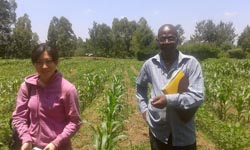 |
|
10 |
| PhD update: Response of Groundnut varieties to Rhizobia inoculation in the Sudan and northern Guinea savannas of Nigeria |
My names are Umar, Faruk Galadanchi. I enrolled for my PhD programme at Bayero University, Kano, Nigeria in the 2013/2014 session. I developed my research topic and got the approval of my supervisory team, which consists of Prof. Ado A. Yusuf, Prof. Jibrin M. Jibrin, Dr. Abdelaziz Abdelgadir (IITA based supervisor) in collaboration with Dr. Babu N. Motagi (ICRISAT-Kano Station), to start the field work. ...
|
11 |
| Introducing Minke Stadler |
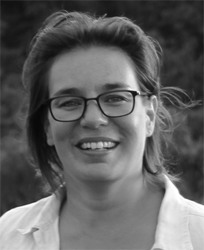 |
This month, Minke Stadler joined N2Africa as a research fellow. She wil be analyzing data, developing reports, and giving support where needed.
Minke holds a MSc. in Human Resource Management and a MSc. in Farming Systems Ecology. She worked for twelve years as a consultant, providing advisory services in the field of project management and talent development.
Last June, she graduated at the Wageningen University (CGIAR-program in Barotse floodplain, Zambia). ...
|
|
12 |
| Message from Pamela Anderson, Bill & Melinda Gates Foundation on the launch of AgriKnowledge |
Dear grantees and partners,
I’m excited to inform you about the launch of AgriKnowledge – an online portal to publically share learnings from grants and contracts funded by the Bill & Melinda Gates Foundation’s agricultural development team.
The URL is: www.AgriKnowledge.org ...
|
13 |
| N2Africa in the news |
In the September issue of the Dutch magazine Vork, published by Agrio, a critical platform that discusses developments in the food chain, an interview entitled "Stik-stofbinding voor kleine boeren in Africa (Nitrogen fixation for smallholder farmers in Africa)" with Ken Giller was published. In 6 pages it shows photos and gives information on the background and aims of N2Africa.
|
14 |
| N2Africa publications |
A publication by Fidèle Barhebwa Balangalize et al.: Competitiveness of smallholder legume production in South Kivu region, Democratic Republic of Congo.
|
15 |
| Reports uploaded on the N2Africa website |
4 MSc theses, 1 BSc thesis, a workshop report "Taking Stock and Moving Forward and the N2Africa Communication Master plan have been uploaded.
|
16 |
| Related publications |
Can Short-season Grain Legumes Contribute to More Resilient and Productive Farming Systems in Semi-arid Eastern Kenya? A publication by A. Sennhenn, D.M.G. Njarui, B.L. Maass, A.M. Whitbread in Procedia Environmental Sciences (Volume 29, 2015, Pages 81–82).
|
17 |
| Announcements |
|
18 |












